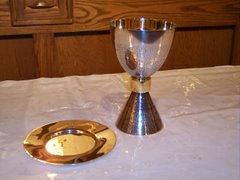“The American Catholic writer Flannery O’Connor was once invited to a
The previous paragraph was first published in The Catholic Herald as the preamble to an interview with Archbishop of Canterbury Rowan Williams regarding the meaning of the Eucharist. The Archbishop when asked affirms O’Connor’s sentiment if not her language.
I am often asked what happens in the Eucharist. Does the bread and wine actually become the body and blood of Christ? And if it does, isn’t that kind of gross? The cheap cop-out answer is of course, “The Eucharist is a mystery which we will never completely understand.” This answer is true if not very helpful.
So, what do I believe the Eucharist is, or what do I believe happens in the Eucharist? First, I believe that relative to God human beings are pretty dim. Consequently God has to overcome our relative lack of comprehension in order to communicate God’s love for us. We see an overarching story of God trying to get through to us the extent to which God wants to be in relationship with us. From Abraham to Moses to David, from Sarah to Deborah to Esther and to Mary, the Scriptures tell of God’s desires to be in so deep a relationship with us that we would be one. The climax of this story is of course Jesus—the word of God made flesh. Looking at Jesus’ story, he even had trouble getting across the message; so finally he says look, “I am the word of God made flesh. I and God are One. I want you and I to be One as God and I are One. So, I’ll become bread and wine. You eat the bread, drink the wine and then you and I’ll will be one. Get it?” The disciple’s reply probably something along the lines, “Not really, but whatever you say boss.”
I do not really “get” the Eucharist in a completely definable way, in the way say St. Thomas of Aquinas explained it. I do however know that God loves me and wants me to encounter that love. God has infinite ways of communicating that love, some I am aware of and some I’m not. One that I am acutely aware of is the Eucharist. In the bread and wine, in the body and blood of Christ, we encounter the risen Christ. The same Christ the disciples encountered, and all the faithful have encountered. As the Archbishop of Canterbury says in the same interview, “The Eucharist is not a visual aid and it’s not a jog to memory. It’s an event, an encounter. And if it is not an event in which some utterly earth-shaking change occurs, if it is not an encounter with the risen Christ, well, indeed, to hell with it.”

1 comment:
Jason - nice post! I really like what ++Rowan had to say. I am confronted with Jesus saying, "This IS my body..." and "this IS my blood." What about that "IS" - something other than declaring that it becomes something else in some way?
You're the one that had all the Greek classes, so what does the Greek convey - this word "IS?" :-)
Post a Comment